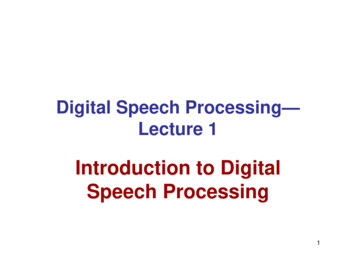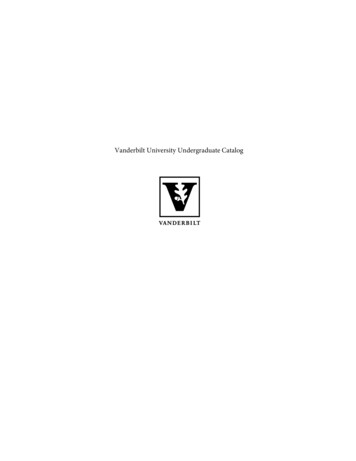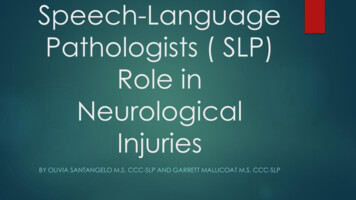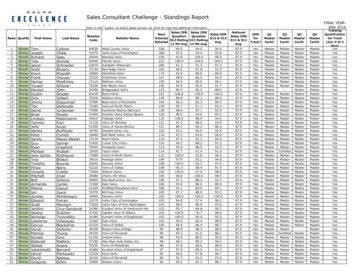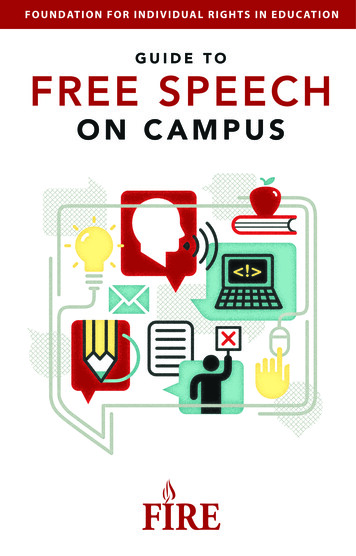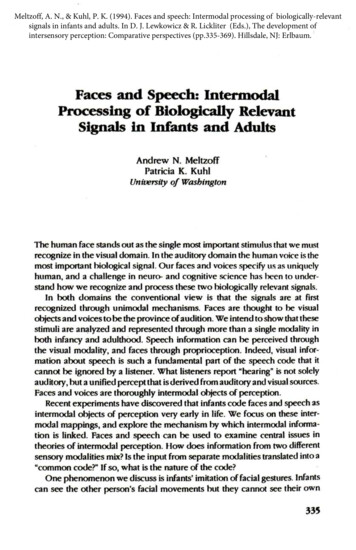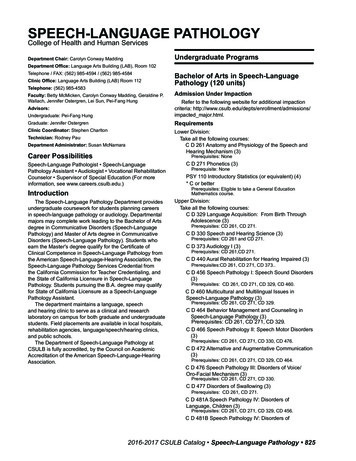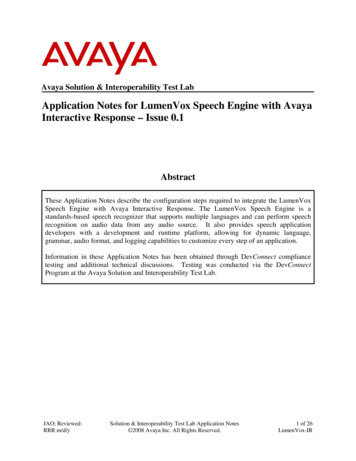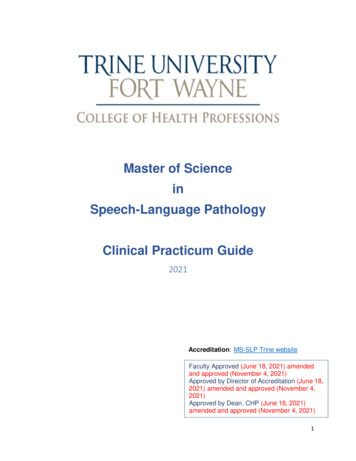
Transcription
Master of ScienceinSpeech-Language PathologyClinical Practicum Guide2021Accreditation: MS-SLP Trine websiteFaculty Approved (June 18, 2021) amendedand approved (November 4, 2021)Approved by Director of Accreditation (June 18,2021) amended and approved (November 4,2021)Approved by Dean, CHP (June 18, 2021)amended and approved (November 4, 2021)1
Welcome to the MS-SLP Program and Clinical Practicum!The goal of the MS-SLP clinical education program is to provide you, the MS-SLP studentclinician, with the knowledge and skills to practice as a speech-language pathologist in evolvinghealthcare and educational systems to serve the needs of an increasingly diverse community.Trine University and the MS-SLP program has the expectation of the highest standards ofprofessionalism and clinical practice, and we depend on you to help us maintain thisexpectation.During your MS-SLP program, you will experience a variety of clinical experiences. Eachexperience will increase your clinical skills and prepare you to be a speech-languagepathologist. Confidence and independence will come after many hours of planning, evaluation,intervention, data collection, data analysis, and documentation.You will be immersed in professional settings where interprofessional collaboration is key forbest patient care. It is important that you become aware of your professional scope of practicethrough American Speech-Language-Hearing Association (ASHA) (included in this practicumguide), so that you can communicate with other professionals for the best intervention/care forthe person being treated. You are the professional representing speech-language pathology onthe team.While you are working with clients, remember that their care is why we are here, and theirwelfare is paramount. It is with the utmost respect and dignity that we must treat each individualthat is entrusted into our care. We must value each person for their differences, determine howwe can assist with their communication and swallowing skills, and advocate as appropriate.As you navigate each of your clinical experiences, the clinic director will connect you with theclinical educator at each practicum site. This person will be a valuable resource for you!Enclosed in this practicum guide you will find your responsibilities and your clinical educator’sresponsibilities, be prepared and know what these responsibilities are before you go to the site.Learn from this person and follow their lead.Resources are listed throughout this practicum guide you should keep this as a reference guide,it will be a useful resource during all five of your semesters of practicum while in the MS-SLPprogram.Chanda Lichtsinn, M. S. CCC-SLP Program DirectorAbbey Guyll, M. A. CCC-SLP Clinic Director2
Table of ContentsCURRICULUM (CAA 1.9.3) . 5The Clinical Practicum: Degree Requirements (CAA 3.4.3, 4.4.4). 5ASHA Code of Ethics (CAA 3.10.1). 6ASHA’s Scope of Practice (CAA 3.2.4) . 6Code of Conduct (CAA 3.8, 3.10) . 7Professional Behaviors . 7Commitment to Program Quality Improvement (CAA 1.4.4., 3.9.5, 5.3.1, 5.3.2, 5.3.4, 5.3.6,5.10.3) . 8MS-SLP Academic and Clinical Education Standing Policy. 8ACADEMIC STANDARDS . 9Grading System (CAA 1.9.3, 5.1.3) . 9Academic and Clinical Advising Policy (CAA 2.2.2B, 4.3, 4.4, 4.6.1, 4.7, 5.1) . 10INTERVENTION PLAN POLICY . 10Academic and Clinical Intervention (CAA 4.3.1) . 10Academic and Clinical Intervention Plan (CAA 4.3.2) . 10Castle Branch. 11Certificate of Liability Insurance . 11Health Insurance . 11Substance Abuse Testing (CAA 3.8.4) . 11Immunizations. 12Titers (require blood to be drawn) . 12Vaccinations . 12Annual TB Screen (CAA 3.8.4) . 12Medical Contraindication/Waivers . 12Background Check . 13Practicum and Externship Policies and Procedures . 13HIPAA Training Policy (CAA 3.7.4, 3.8.4) . 13OSHA Training Policy (CAA 3.8.4) . 14MS-SLP Program First Aid/CPR Policy (CAA 3.8.4) . 14Cellphone and Electronic Use Policy . 14Social Media Policy . 14Activities that May be Grounds for Dismissal from the MS-SLP Program (CAA 3.10B.2). 153
Unprofessional Behavior that May be the Basis for Disciplinary Action (CAA 3.10B.2) 15Director of Clinical Education (Clinic Director) Responsibilities . 17Practicum Placements (CAA 3.1B.12, 3.3, 3.4, 3.6, 3.7, 3.9, 4.2) . 17Notification of Placements . 18Affiliation Agreements (CAA 3.9.1). 18CALIPSO (CAA 3.1B.16, 3.7.1, 5.3.8) . 18Clock Hour Requirements (CAA 2.3.3, 2.3.5) . 19CFCC Certification Competencies (CAA 4.7.2) . 19Clinical Fellowship. 20Student Clinician Responsibilities . 20Expectation (CAA 3.10B.1) . 20Cultural Sensitivity and Diversity (CAA 3.4.3, 4.2.1) . 20Class and Clinic Attendance Policy (3.10B). 21Dress Code . 21Student Clinician and Clinical Educator Partnership . 21Orientation (CAA 3.7.4) . 22Authorized persons in clinic areas. 22Recording and Documenting Clients. 22Clinical Educator Qualifications and Responsibilities. 23Clinical Educator Qualifications (CAA 2.3.4, 2.3.5, 3.9.4) . 23Clinical Educator Responsibilities (CAA 3.3.5, 3.7.1, 3.8.1, 3.8.2, 3.8.4). 23Practicum Grading . 23Documentation and Coding . 24Documentation (CAA 3.7.4, 3.8.4) . 24ICD-10-CM codes. 24CPT codes . 24Data Collection (CAA 3.7.4, 3.8.4) . 24Professional Development Plan . 24Resources . 25Student Grievance Procedure (CAA 1.8.4, 4.5.1, 4.5.2, 4.5.5) . 26Filing a Complaint about the Program to CAA . 27Clinic To Do List . 28Weekly Clinical Supervision Meeting Form . 294
MS-SLP Practicum Selection Form . 30Intervention Plan . 33Externship Selection Form . 34MS-SLP Portfolio Final Grading Rubric . 35Professional Development Plan Checklist. 36Self-Reflection Form . 42Give yourself 2 points for yes, 1 point for sometimes, and zero for no. What is yourpercentage? . 42MS-SLP Student Code of Conduct Agreement . 43Code of Ethics Agreement. 43CURRICULUM (CAA 1.9.3)The MS-SLP curriculum is available on the Course Catalog Trine University.Practicum hours/weeksPracticumPracticum I (3) starts second 8-weeksPracticum II (3)Practicum III (3)Practicum IV (6)Externship (6)Hours per week10 hours per week15 hours per week20 hours per week30 hours per week40 hours per weekWeeks8-weeks8-weeks12-weeks12-weeks15-weeksThe Clinical Practicum: Degree Requirements (CAA 3.4.3, 4.4.4)The MS-SLP program at Trine follows CAA and CFCC (ASHA) requirements ASHA 2020 SLPcertification standards link. During a variety of clinical experiences, students will complete clockhours (face-to-face time) toward the minimum of 400 clinical hours. At least 375 direct clientcontact hours must be earned during your graduate school clinical practicums and theexternship. It is preferred that the twenty-five hours of guided observation be completed prior tograduate school with appropriate documentation.Guided clinical observation will precede placement in a practicum in the MS-SLP program.Guided observation typically consists of the observer, clinical educator and client. The observerand the clinical educator will debrief following the session. Evidence to provide could includedates, hours, activities observed, and signature from a clinical educator who holds CCC-SLP.Trine University and the MS-SLP program does not accept the transfer of clinical hours earnedat the undergraduate level. Only observation hours are accepted with documentation.During the achievement of the 375 face-to-face hours earned, the MS-SLP program requires aminimum of 50 hours of treatment with adult clients, and a minimum of 15 hours of evaluationwith adult clients. Further, the program requires a minimum of 50 hours of treatment withpediatric clients, and a minimum of 15 hours of evaluation with pediatric clients.Per the CAA the program’s academic and clinical standards must include the following:5
1. Nine professional practice competencies (page 15-17 in this practicum guide)2. Foundations of speech-language pathology practice3. Identification and prevention of speech, language, and swallowing differences anddisorders4. Assessment of speech, language, and swallowing differences and disorders5. Intervention to decrease the impact of speech, language, and swallowing differences,and disordersStudent Learning Outcomes (CAA 2.1.1): Students who graduate from Trine’s Master ofScience in Speech-Language Pathology program will demonstrate:1. The ability to evaluate, diagnose, plan and provide intervention for individuals withcommunication and swallowing impairments across the lifespan using an evidence-basedpractice framework.2. An understanding of and observance of ASHA’s code of ethics, and the standards ofpractice endorsed by the profession.3. Knowledge and skills of different organizational frameworks and clinical delivery modelsacross educational and healthcare settings.4. The skills to contribute to the profession and the community by engaging in lifelonglearning, service, and community advocacy and education.ASHAAs the professional organization for speech-language pathologists, ASHA has many resourcesand benefits to being a member both as a student and professional. One benefit is that you can,as a student, attend the state and national conferences, and student conclave at discountedrates.Trine University MS-SLP students are strongly encouraged to become student members ofASHA. The National Student Speech-Language-Hearing Association (NSSLHA) is the studentorganization for pre-professionals studying communication sciences and disorders recognizedby ASHA. Students are advised to participate in state chapter and national activities. Studentswho have questions are encouraged to visit the ASHA website (ASHA.org) and speak with youracademic advisor for more information.ASHA Code of Ethics (CAA 3.10.1)The American Speech-Language-Hearing Association (ASHA) has adopted the Code of Ethicsfor all speech-language pathologists. It is the responsibility of the MS-SLP student to uphold thiscode in all situations. Failure to uphold the ASHA code of ethics could result in the failure of acourse or clinical experience, or result in removal from the program. The MS-SLP programCode of Ethics Agreement Form (appendix page 43) is to be signed and put into the ClinicalTracker from Castle Branch (see page 11-13) prior to placement at a clinical practicum.ASHA’s Scope of Practice (CAA 3.2.4)ASHA states that the Scope of Practice in Speech-Language Pathology is to:1. Delineate areas of professional practice2. Inform others about professional roles and responsibilities of qualified providers3. Support SLPs in the provision of high-quality, evidence-based services to individualswith communication, feeding, and /or swallowing concerns4. Support SLPs in conducting and disseminating research5. Guide education preparation and professional development of SLPs to provide safe andeffective services.6
Refer to C:\Users\goelzk\Downloads\ASHA's Scope of PracticeASHA Scope of Practice for completeinformation on the Scope of Practice Policy for Speech-Language Pathology.Code of Conduct (CAA 3.8, 3.10)To ensure consistency and compliance with all students, each MS-SLP student will be requiredto affirm that they have read the policies contained within this clinical practicum guide, includingthe ASHA Code of Ethics and ASHA Scope of Practice, and follow them as they are assigned topracticums. The MS-SLP program Code of Conduct Agreement Form (appendix page 43) isto be put in the Clinical Tracker from Castle Branch (see page 11-13). You will be required tosign this form prior to placement at a clinical practicum.Professional BehaviorsProfessional behavior is, without exception, required. It is expected that all studentsdemonstrate behaviors consistent with those of healthcare professionals. It is required that allstudents exhibit these behaviors in the classroom and clinical practicum settings, during sitevisits, clinical externships, and service learning activities. Failure to demonstrate thesebehaviors could result in failure of a course or clinical experience. Professional behaviors (listedin the MS-SLP Student Handbook) and the nine CAA professional competencies, starting onpage 15, are considered required of a speech-language pathologist.All Trine University MS-SLP students are expected to:1. Demonstrate safe performance of activities, sensitivity to individuals, appreciation foralternate points of view, respectful communication, concern for self, cooperation withothers, and acceptance of personal and corporate responsibility for the coursework.2. Show respect for facilities and equipment in the College of Health Professions and in theclinical education settings.3. Present an appropriate personal appearance in classrooms, laboratories, and clinicaleducation settings and at public meetings where their identity as speech-languagepathology students is apparent. Please refer to the dress code for details.Professional behaviors are evaluated by self-assessment, clinical instructors, peers, and faculty.Written clinical instructor comments and instructor observation of student performance providethe basis for counseling on professional behavior. It is expected that most cases of professionalmisbehavior can be successfully corrected by sensitive discussion and counseling between thefaculty and the student. A plan for intervention can be developed and implemented as needed.(see Intervention Policy)Commitment to Diversity (CAA 1.8.1)Trine University remains committed to cultivating diversity, inclusion and fairness. As a leadingprivate institution of higher education, Trine fosters a culture of understanding, growth andinquiry; values the diverse qualities of its students, faculty and staff; promotes an inclusiveenvironment free of discrimination and intolerance; and welcomes everyone. Trine will not allowdiscrimination and will continue to grant admission and provide educational opportunitieswithout regard to race, age, disability, gender, gender identity, sexual orientation, marital status,national origin, religion or veteran status. The culture of Trine University dictates that thesesame standards of acceptance apply to all faculty, staff, alumni and community members.7
Commitment to Program Quality Improvement (CAA 1.4.4., 3.9.5, 5.3.1, 5.3.2, 5.3.4, 5.3.6,5.10.3)The academic assessment process at Trine University is designed to measure the abilities andknowledge of students graduating from all degree programs. It also measures studentsatisfaction with the program.Students will be asked to reply to surveys or questionnaires that rate the quality of instruction,the level of satisfaction with career preparation, and the overall satisfaction of the Trineexperience. Occasionally, anonymous samples of student course work will be used in anassessment process.Use of this information is vital to our program for academic credentialing with the Council onAcademic Accreditation (CAA) and ASHA. Trine University is committed to providing qualityeducational experiences for our students. The information gathered through the assessmentprocess provides information for continual improvement of our program.MS-SLP Academic and Clinical Education Standing PolicyAcademic and Clinical Education Requirements (CAA 5.5.4):Students admitted to the Master of Science in Speech-language Pathology are required to meetthe criteria of the program as follows: Earn a minimum GPA of 3.0 each semesterEarn a minimum cumulative GPA of 3.0Earn no more than 6 credit hours below a BAcademic and Clinical Program Probation (CAA 4.6.6):A student will be placed on academic probation under this condition: Earning a semester GPA below 3.0 onceUpon earning an overall GPA below 3.0, the student will be referred to the AcademicReview Committee.Following a review by the Academic Review Committee, the Dean of the College ofHealth Professions can place the student on probation.Failure of a clinical course will result in the student being placed on probation. Thestudent will be required to repeat the clinical prior to moving forward to a more advancedpracticum. Due to the cohort nature of the MS-SLP program, further didactic courses willnot be permitted until the successful clinical experience has been achieved. Clinicalhours obtained during an unsuccessful clinical experience will not count toward theminimum required clock hours for graduation.Academic and Clinical Program Dismissal (CAA 3.10.2):A student will be academically dismissed under these conditions: Earning more than 6 credit hours below a BEarning a semester GPA below 3.0 twiceUpon earning an overall GPA below 3.0 twice, the student will be referred to theAcademic Review Committee.8
Following a review by the Academic Review Committee, the VPAA can dismiss thestudent.Appeals and Incomplete Grade Policy (4.3, 4.4):The awarding of grades is the prerogative of the classroom instructor in accordance with TrineUniversity policies. Please refer to the Trine University Student Handbook and Trine UniversityCourse Catalog for information regarding grading appeals, incomplete grade, in-progress grade,and course repeat policies.Trine University Institutional Policy for Satisfactory Academic Progress (SAP) (4.2.3):Federal regulations mandate that all students make satisfactory, measurable academicprogress toward completion of a degree in order to receive federal assistance through Title IVfederal grant, work, and loan programs; as well as all institutional and state grant/awardprograms. Follow this link for full information starting on page 22 Trine University StudentHandbook.College of Health Professions Academic and Clinical ReviewCommitteeThe Academic Review Committee promotes adherence to academic standards and programspecific standards of conduct. The committee consists of 5 program directors, 2 ad hoc faculty,and the Dean of the College of Health Professions. Examples include but are not limited to:plagiarism, cheating on an exam, falsifying clinical documentation, failure to meet programrequirements for academic standing such as GPA, course repeats, progression, etc. Otherinstances of misconduct, specifically non-academic behavior, are referred to the dean ofstudents (DOS) by the program director immediately after the incident occurs as outlined in theUniversity handbook.Steps for the Academic and Clinical Review:Step 1: Program level investigation and recommendation from the program director submitted tothe dean of CHP who convenes the Academic Review Committee.Step 2: Academic Review Committee examines evidence, student statement (s), and policybefore making a recommendation.Step 3: Dismissal recommendations are forwarded to Vice-President of Academic Affairs(VPAA) and DOS. Non-dismissal decisions are at the level of the dean of CHP’s discretion.Step 4: VPAA and DOS review investigation documentation and recommendation from thedean of CHP. Render final decision on the dismissal and information the student, dean, andprogram director.ACADEMIC STANDARDSGrading System (CAA 1.9.3, 5.1.3)AVery Good to ExcellentBGood to Very Good4.090-100%3.080-89%9
CFair2.070-79%DPoor1.060-69%FFailing0.0 60% 80% for a final course grade is not considered within academic standing for the MSSLP program (see below) 80% on a course assignment, examination, or at midterm on a practicum would resultin a referral to the Student Success Committee for assistance on intervention. (SeeAcademic and Clinical Intervention Policy)Academic and Clinical Advising Policy (CAA 2.2.2B, 4.3, 4.4, 4.6.1, 4.7, 5.1)The academic advisor is responsible for advising students in didactic education. The advisor willprovide support to the student throughout the academic coursework.During these academic advising sessions, a review is completed of the student’s progresstoward achieving knowledge and skills. The CALIPSO tracking form is utilized and documentedduring this session.Clinical Advising is completed by the clinical director and others as assigned. This advising willsupport the student, the clinical educator and other supervisors during the student’s practicumexperiences.Each student in the MS-SLP program will meet with their academic and clinical advisors duringeach semester.If there are concerns regarding performance in either course work or practicum skills, youradvisor is there to assist with an intervention plan. This intervention plan will be carried out bythe student while being monitored by the academic or clinical advisor. (See section on gradingfor further information on the intervention plan.)INTERVENTION PLAN POLICYAcademic and Clinical Intervention (CAA 4.3.1)Should a student have difficulty achieving a learning outcome during an academic course orpracticum, have an assignment grade below a “B,” or demonstrate difficulty with clinical skilllevels as indicated by a clinical educator that could cause the student to fail the practicum, ateam meeting will occur. For a clinical intervention, the team will consist of the clinic director,student clinician, and clinical educator. For academic intervention, the team will consist of thecourse instructor, the student and the student’s academic advisor. Should an additional personbe required, the program director can assist in an intervention meeting/plan creation.Academic and Clinical Intervention Plan (CAA 4.3.2)A written Intervention Plan (form Appendix page 33) will be created with a specific timeline forcompletion, with expected outcomes, and selected tasks for the student to complete outlined.The plan will be signed by each member of the team.Selected tasks for the Intervention Plan are to be guided by the clinic director and/or clinicaleducator. Selected tasks can include, but is not limited to the following examples: Observation of therapy session with targeted skill being modeled10
Assigned readings from the clinical educator Simulated exercises Role-playing exercises with an assigned partner and taskAt the end of the allotted timeline, the student’s skills will be reassessed by the clinical educator.At that time the student clinician, clinical educator and clinical director will meet again todetermine the outcome of the Intervention Plan. Action steps could be continuation of the plan,conclusion the Intervention Plan as successful, and/or clinical probation.A copy of the completed Intervention Plan is to be sent to the program director for review andplacement in the student’s file.Castle BranchClinical Tracker from Castle Branch is an easy to use platform that the MS-SLP programutilizes as a database to collect and store information related to your personal health informationand information that pertains to clinic Castle Branch link. Registration for Clinical Tracker fromCastle Branch is a part of your orientation packet information. Note: you will be required topay a fee for services for Castle Branch Clinical Tracker to store your personal information foryour clinical experiences.Once you have completed reading the policies that are contained within this clinical practicumguide, you will log-in to your Castle Branch
Certificate of Liability Insurance . ASHA . As the professional organization for speech-language pathologists, ASHA has many resources . The American Speech-Language-Hearing Association (ASHA) has adopted the Code of Ethics for all speech-language pathologists. It is the responsibility of the MS-SLP student to uphold this

